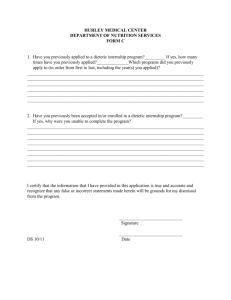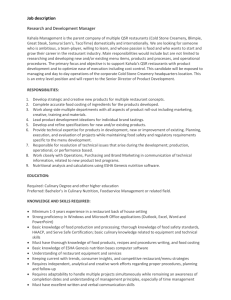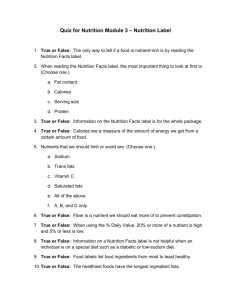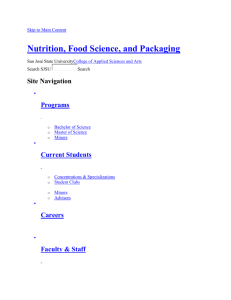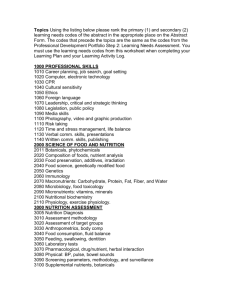Johnson & Wales University Culinary Nutrition DPD Program
advertisement
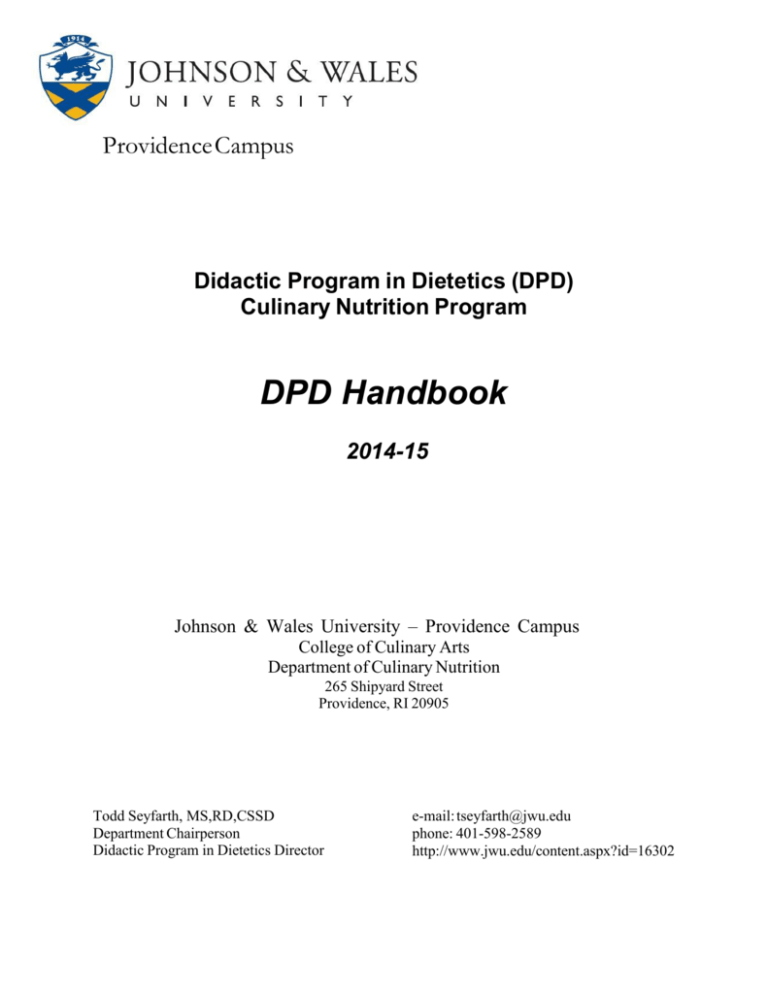
Providence Campus Didactic Program in Dietetics (DPD) Culinary Nutrition Program DPD Handbook 2014-15 Johnson & Wales University – Providence Campus College of Culinary Arts Department of Culinary Nutrition 265 Shipyard Street Providence, RI 20905 Todd Seyfarth, MS,RD,CSSD Department Chairperson Didactic Program in Dietetics Director e-mail: tseyfarth@jwu.edu phone: 401-598-2589 http://www.jwu.edu/content.aspx?id=16302 TABLE OF CONTENTS Introduction 3 Accreditation and Affiliations 3 Program Philosophy 4 Johnson & Wales University Mission and Guiding Principles 5 University Outcomes 6 The Culinary Nutrition Program Mission Statement and goals 6 The Culinary Nutrition Program and DPD Handbook 7 Culinary Nutrition Concentrations 8 Career Opportunities 9 Application Procedure for the Culinary Nutrition Program 10 Selection into the Program and Advisor Assignment 10 Program Expenses 11 Steps to Becoming a Registered Dietitian (RD) 12 Application Procedure for Dietetic Internships 12 Dietetic Technician Registration Pathway 12 Graduate School Opportunities 13 Culinary Nutrition Program Faculty – College of Culinary Arts 15 Providence Campus Student Handbook 16 Filing and Handling of Complaints Related to the Didactic Program in Dietetics 17 Assessment of Prior Learning and Credit Toward Program Requirements 19 Formal Assessment of Student Learning 19 DPD Retention and Remediation Procedures 20 Disciplinary/Termination Procedures 20 Graduation and/or DPD Completion Requirements 20 Amendments 21 Appendix 1 – Verification Statement Policy Agreement 22 2|Page JWU DPD Handbook Introduction Welcome to the Johnson & Wales University Culinary Nutrition Program! Johnson & Wales University was the first in the country to offer a Bachelor of Science Degree in Culinary Nutrition that is accredited by the Academy of Nutrition and Dietetics. This program is designed for students seeking to apply culinary arts skills to their nutrition practice. In recent years, the health care system has included more health maintenance activities in addition to the therapeutic treatments. Individuals have also become more interested in lifestyle practices that promote optimal health. The Culinary Nutrition Program at Johnson & Wales University develops students who are prepared to use their culinary and scientific knowledge to improve health and human performance. The Culinary Nutrition Program is housed within the College of Culinary Arts, which has been educating some of the world’s best-trained culinary professionals for more than 30 years. The Culinary Nutrition Program is taught by registered dietitians, highly trained, master’s prepared, professional chefs, scientists and liberal arts faculty. This cohesive group of educators facilitates student learning of the skills and knowledge required to apply for a dietetic internship and or master’s program. Program graduates who become registered dietitians are working in a clinical setting, an athletic performance capacity, in a public health agency or in their own culinary nutrition practice, for example. Some graduates of the program choose to specialize in food science and will apply their nutrition education in the food research and development field. Accreditation and Affiliations Johnson & Wales University (JWU) is accredited by the New England Association of Schools & Colleges, Inc. (NEASC) through its Commission on Institutions of Higher Education. This accreditation encompasses the university’s four campuses in Providence, RI; North Miami, FL; Denver, CO; and Charlotte, NC. The Providence Campus Culinary Nutrition program has been granted accreditation by the Accreditation Council of Education in Nutrition and Dietetics (ACEND) of the Academy of Nutrition and Dietetics, 120 South Riverside Plaza, Suite 2000, Chicago, IL 60606-6995, (312) 899-0040 (x 5400). The Didactic Program in Dietetics (DPD) meets the 2012 Eligibility Requirements and Accreditation Standards of ACEND. -Program outcomes data are available on request. 3|Page JWU DPD Handbook Program Philosophy The goal of the Culinary Nutrition Degree Program is to incorporate the College of Culinary Arts outcomes of technical and cognitive skills to develop a self-reliant professional who is able to: 1. Manage the delivery of quality nutrition services to diverse populations. 2. Implement the Nutrition Care Process within the interdisciplinary framework of health care. 3. Incorporate present day nutrition theory into classical, ethnic and plant-based cuisines. 4. Assure that food service operations meet the safety, food and nutrition needs of clients. 5. Participate in activities that promote nutrition and the profession of dietetics. Culinary Nutrition students also benefit from health care and industry alliances the University has established, which lead to undergraduate internships. In addition, students can take advantage of the resources offered by our Experiential Education and Career Services Office. Every Culinary Nutrition Student participates in an 13 week internship in the senior year. Johnson & Wales University has been a leader in offering these experiential learning opportunities. In 2012, Tulane University Medical School and The Culinary Nutrition Program at Johnson & Wales University entered into groundbreaking long-term collaboration that unites medical students and culinary nutrition students in improving the nation’s health through the teaching of culinary medicine. For the first time, a medical school and a leading culinary institution have implemented a fully integrated, comprehensive joint curriculum for doctors, medical students and culinary nutrition students. The focus is on the significant health role that food choices and nutrition play in preventing and managing obesity and associated diseases. Fourth year medical students from Tulane University Medical School work alongside Culinary Nutrition Students in culinary labs such as Vegetarian Cuisine and they also participate in undergraduate courses such as Medical Nutrition Therapy and Advanced Medical Nutrition Therapy. Culinary nutrition students participate in undergraduate internships sponsored by Tulane Medical School. Find more information on the collaboration at: http://www.jwu.edu/content.aspx?id=61958 4|Page JWU DPD Handbook Johnson & Wales University Mission and Guiding Principles Johnson & Wales University … an exceptional education that inspires professional success and lifelong personal and intellectual growth. In support of our mission and recognizing the importance of preserving our unique studentcentered culture we will be guided by the following principles: Undertake continuous improvement and planning for a sustainable future Foster a teaching-focused university that encourages appropriate scholarship and offers relevant programs that maximize student potential Enrich our academic programs with experiential and work-integrated learning Be cost-conscious in our endeavor to provide an affordable private university education and be a good steward of our resources Embrace diversity for a richly inclusive community Model ethical behavior and local, national and global citizenship Value our faculty and staff by investing in their quality of life and professional development Provide facilities, technology and other resources to meet the needs of students, faculty and staff 5|Page JWU DPD Handbook University Outcomes Professional Competency Graduates are expected to demonstrate professional competency and skill within their academic discipline. Career Development Graduates are expected to demonstrate the knowledge, skills, and attitudes to obtain best fit employment in their chosen profession. General Education Graduates are expected to demonstrate competence in general education skills including written and oral language competency, critical thinking, ethical awareness, aesthetic sensibility, environmental awareness, quantitative literacy and community leadership to enhance their specialized knowledge, skills and abilities. Global Diversity Graduates are expected to apply knowledge of diverse perspectives pertinent to workplace settings and the global environment. Culinary Nutrition Mission Statement and Program Goals The mission of the DPD is to prepare entry-level Registered Dietitians for current and future success by blending the fields of culinary arts, nutrition science, and dietetics. The DPD supports the institutional mission of JWU by providing an exceptional education that fosters professional success and lifelong personal and intellectual growth. Program Goal 1: The DPD will prepare graduates for entry into dietetic internships through high-quality culinary nutrition education. Program Objectives for Goal 1: 1.1 Within 12 months of graduation, 40% of graduating seniors who have chosen the Clinical/Dietetics concentration and achieved the qualifications for a verification statement will apply to a dietetic internship program. 1.2 Within 12 months of graduation, 50% of the seniors who have chosen the Clinical/Dietetics concentrations and have applied to a dietetic internship program will be accepted. 6|Page JWU DPD Handbook Program Goal 2: The DPD will graduate a diverse population of students that are well versed in the craft and skills of culinary arts, and who demonstrate the ability to pair those skills with the science of nutrition and integrate them into the practice of dietetics. Program Objectives for Goal 2: 2.1 Over a five-year period, the program will average a first-time pass rate on the dietetic registration exam of 80%. 2.2 Over a five-year period, the program will average a one year pass rate on the dietetic registration exam of 85% 2.3 Over a five-year period, 90% of dietetic internship directors who return the survey, will rate the program graduates ―satisfactorily prepared‖ or higher for the supervised practice experience. 2.4 Over a five-year period, 85% of graduates who returned the survey one year after completing the dietetic internship, will rate their preparation for supervised practice as ―satisfactory‖ or higher. 2.5 Over a five-year period, 80% of the students entering the CN program as a junior and who declare the Clinical/Dietetics concentration will complete the program within three years. 2.6 Within five-years of completing the program, 90% of surveyed graduates will report that they incorporate culinary arts into their practice. 2.7 Within five-years of completing the program, 70% of surveyed, employed graduates will report that they hold a position of leadership in dietetics, academics, culinary or community settings. The Culinary Nutrition Program and DPD Handbook By attending Johnson & Wales University, you have agreed to conform to the rules, codes, and policies as outlined in this publication, as well as in the catalog, all applicable student handbooks, and the Resident Student Contract, including any amendments. You have demonstrated your commitment to developing and enhancing your professional as well as your personal life. As part of this commitment, you must demonstrate acceptance of your responsibilities as a member of the university community. It is expected that you will conduct yourself in a professional and courteous manner in and out of the classroom. Familiarize yourself thoroughly with the contents of this handbook — ignorance of the rules will not excuse infractions. You are required to abide by all the rules, codes and policies established by the university, which apply to all students (including commuter students) and must be followed both within and outside of university facilities and common areas. 7|Page JWU DPD Handbook Culinary Nutrition Concentrations A concentration is an opportunity to pursue a subject or area of special interest to a student. Beyond the enrichment a concentration provides, the student’s transcript will reflect commitment to a particular area, which may be attractive to prospective employers. Two concentrations are offered within the Program: Clinical/Dietetics or Culinary Food Science The Clinical/Dietetics Concentration provides the required emphasis for students who are interested in applying for a postgraduate dietetic internship program. Successful completion of this internship qualifies the student to take the National Examination for Registered Dietitians. The courses required for this option are noted below. The Culinary Food Science concentration prepares students to enter the Product Research and Development area of expertise with food companies. The courses required for this option are noted below. Students may wish to complete both concentrations. To do so, they will take two classes beyond their degree requirements. CLINICAL/DIETETICS? Courses Credits NUTR3030 Nutrition Assessment* 4.5 NUTR4030 Medical Nutrition Therapy 4.5 NUTR4630 Advanced Medical Nutrition Therapy 4.5 Total 13.5 CULINARY FOOD SCIENCE CUL4111 Product Design and Development 4.5 FSM3025 Food Science* 4.5 NUTR3510 Principles of Food Product Development 4.5 Total 13.5 *These two courses are components of the two culinary nutrition concentrations. However, they are also part of the core culinary nutrition curriculum and are required for all Culinary Nutrition majors. 8|Page JWU DPD Handbook Career Opportunities Upon completion of the Culinary Nutrition bachelor’s degree program, students are prepared for these professional practice areas: Registered Dietitian, upon completion of a post-graduate dietetic internship and successful completion of the Examination for Registered Dietitians o Community and Public Health Settings o Corporate Wellness o Food Manufacturers, Business & Industry o Hospitals or other Health-Care Facilities o Management o Media work o Personal Chef o Private Practice o Research o Restaurants o Sports Nutrition o Supermarket Dietitian o Universities and Medical Centers Food Service Management o College/ University Food Service & Catering o Industrial/ Business Food Service & Catering o Restaurant/ Hotel Management o School/ Senior Lunch o Food Microbiology o Product Development o Public Relations and Sales o Quality Assurance o Research Chef o Senior Living, Long Term Care or Assisted Living Personal Chef o Catering for special dietary needs o Cookbook Writing Spas and Restaurants o Chef o Management o Menu Development o Demonstrator Miscellaneous o Dietetic Technician, Registered (DTR), after passing exam o Health Clubs o Teacher:; Secondary School / University o WIC Nutritionist 9|Page JWU DPD Handbook INFORMATION FOR PROSPECTIVE STUDENTS Application Procedure for the Culinary Nutrition Program Students or graduates interested in entering the Culinary Nutrition program must have an associate degree in Culinary Arts or Baking & Pastry Arts. Students who have completed a Baking & Pastry Arts program must complete the JWU Associate Degree culinary lab courses. Students transferring from other culinary colleges must meet Johnson & Wales University’s academic requirements. All students must have a 3.0 GPA from their JWU Associate Degree program to apply. Students must complete and submit an application to the program director, Todd Seyfarth, who can be contacted at tseyfarth@jwu.edu or 401-598-2589. The application and all necessary forms may be downloaded from the Johnson & Wales University website: http://linkweb.jwu.edu/culinarybsapp/ . The application consists of: 1. Application form 2. Resume 3. Recommendation forms (three) a. two from chef instructors b. one from academic instructor 4. One letter of recommendation from an outside associate 5. Change of Status form (only needs to be filled out by currently enrolled JWU students) 6. Interview/ Telephone Interview will be schedule with the program director 7. Student Degree Progress – Currently enrolled students can their Degree Progress through JWUlink. Students applying from outside of the University will need an official transcript. Selection into the Program and Advisor Assignment Selection is based on previous academic performance, work experience and professional recommendations. Upon acceptance into the Program, students will be notified by the Program Director with a letter of acceptance. The Program Director will serve as the student’s program advisor within the College of Culinary Arts, and will advise Student Academic Services(SAS) that the student has been admitted into the program. The student will then be given an academic advisor from Student Academic Services who will assist in planning the student’s schedule as noted in the Culinary Nutrition Program of Study set forth in the JWU Catalog available at www.jwu.edu. Students in the Clinical/Dietetics Concentration must complete course work that reflects certain knowledge requirements(KRs) which are specified by the Accreditation Council of Education in Nutrition and Dietetics (ACEND) of the Academy of Nutrition and Dietetics. 10 | P a g e JWU DPD Handbook Program Expenses Tuition and Fees: Information about the tuition rates, housing, and other associated fees with Johnson & Wales University can be found through the JWULink student portal, or via the Johnson & Wales University, Providence, Student Life webpage, under the ―Financial Services‖ Heading. (Providence Home > Student Life > Financial Services . Tuition & Fees: https://www.jwu.edu/content.aspx?id=3580 ) Additional Program expenses are as follows: Books Purchased new, textbook costs average roughly $450 per term during the junior and senior years of the DPD. Culinary Uniforms Included with tuition. Culinary Tool/Knife Kit Included with tuition. Culinary and Science Lab Included with tuition Fees Library Fees Included with tuition General Printing Fees Included with tuition Professional Binding of Roughly $25 per required class: Projects -NUTR:4630 -CUL: 3155 -CUL:3175 -CUL:4175 Student Membership to the $50 per year Academy of Nutrition and Dietetics (*optional) Experiential Education The experience is included with tuition; however additional Senior internship costs around travel, lodging, and other living costs, as well as the student compensation, are variable. Dietetic Internship (DI) Variable, however, the average JWU DPD student applying for application fees a DI will spend $250 - $450 on their application submission (*only required for students pursuing the RD/RDN Credential) 11 | P a g e JWU DPD Handbook Application Procedure for Dietetic Internships The process of applying for a dietetic internship should begin in the student’s junior year. Attaining a dietetic internship is very competitive. The national average for placement in 2013 was 52%. (Source: ―New Approach Used for Analyzing the April 2013 Match Results,‖ ACEND Update, May 2013). Students who apply should be academically strong with a GPA of at least 3.2. It is JWU policy that a student must earn a ―B‖ (3.0) average or better in the core science and nutrition classes listed below in order to be eligible to apply for a dietetic internship. Refer to Policy and Procedure for Verification Statements section in this handbook for further information. SCI2045 – Intro to Gen & Organic Chemistry SCI2031 - Anatomy & Physiology SCI3040 – Biochemistry SCI4060 – Food Microbiology NUTR3030 – Nutrition Assessment NUTR3050 – Life Span Nutrition NUTR4030 – Medical Nutrition Therapy NUTR4630 – Advanced Nutrition Therapy In addition, students should have a significant amount of volunteer or work experience in the clinical nutrition field, preferably in a hospital setting. Additional employment or volunteer experience that exhibits leadership and organizational skills is also valuable. The program director will conduct a meeting in the spring of the students’ junior year. Dietetic Internships and the Graduate Record Examinations for graduate school will be discussed. In the fall of the senior year, another dietetic internship workshop will be held to review the dietetic internship application process, the appropriate, required forms and deadlines. All applications will be submitted and processed electronically through the Dietetic Internship Centralized Application System (DICAS), Applications are due mid-February for a fall placement. Students are notified in April if they have been placed. Students may also apply after graduation in mid-September for a January-February placement. A list of nationwide accredited dietetic internships may be found on the Academy of Nutrition and Dietetics’ website at http://www.eatright.org/students/education/di.aspx. A book entitled ―Application Guide to Supervised Practice 2013-14,‖ listing dietetic internships is available outside of the office of the Program Director, Todd Seyfarth in the HAC Academic Office. Students may view this book or utilize the website to research internship sites. Nutrition and Dietetic Technician Registration (NDTR) Pathway In 2009, The Commission on Dietetic Registration established a new registration eligibility pathway for dietetic technicians. Individuals who have completed both a baccalaureate degree and a Didactic Program in Dietetics (DPD) will be able to take the registration examination for dietetic technicians without meeting additional academic or supervised practice requirements. Pathway III Completion of a Baccalaureate degree granted by a US regionally accredited college/university, or foreign equivalent, and completion of the Accreditation Council of Education in Nutrition and Dietetics (ACEND) Didactic Program in Dietetics (DPD). All candidates must be processed through the Credential Registration and Maintenance System (CRMS) for eligibility to take the examination by their DPD Director. All candidates must complete an application, available on CDR's Web site at: DTRPathway3.pdf; and the DTRE Mis-Use Form: DTRE Mis-Use - Updated 4-09.pdf Examination Candidate Information and Study Resources Computer Based Testing FAQ: www.cdrbet.org/vault/2459/web/files/CBTFactSheet2013.pdf Study Guide for the Registration Examination for Dietetic Technicians, 6th edition: http://www.eatright.org/Shop/Product.aspx?id=5059&CatID=382 "Check It Out Becoming a Dietetic Technician Registered": http://www.eatright.org/students/education/becomeregistered.aspx More information about the NDTR can be found here: http://www.eatrightidaho.org/wp-content/uploads/NDTR-DPD-Credential2.pdf Graduate School Opportunities Many students choose to attain a master’s degree following completion of the Culinary Nutrition Program. There are a number of programs and career directions from which a student may choose. Most programs require that the student take the Graduate Record Examination (GRE) as a part of the application. It is recommended that students take the GRE during the summer between their junior and senior year so they are better prepared to apply for master’s programs. GRE scores are valid for five years. GREs can be re-taken if a student is not satisfied with his or her initial scores. Students may also opt to complete a coordinated program which includes both a master’s degree program and a dietetic internship. At the completion of a two-year graduate program, students will have successfully attained a Master of Science Degree and are eligible to take the examination to become a Registered Dietitian. Below is a list of some of the graduate school opportunities for graduates of the Culinary Nutrition program: Master of Science Clinical Research Exercise Sciences Family and Consumer Sciences Food Chemistry Food Science Food Service Management Food Technology Health Education International Health International Nutrition Medical Sciences Molecular and Biochemical Nutrition Nutrition Nutrition and Dietetics Nutrition Communications Nutrition Education Rehabilitation Services Master of Public Health Public Health Nutrition Health Administration Biostatistics Environmental Health Epidemiology Health Education Maternal and Child Health Master of Education Education Master of Business Administration* Business focus* Hospitality focus** Master of Physician Assistant Studies*** Physician Assistant *These graduate programs are available at the Alan Shawn Feinstein Graduate School at the Providence Campus of Johnson & Wales University in Providence, RI. **This program will begin in the fall of 2013 on the Denver and Providence campus. ***This program began in 2014 on the Providence campus and is housed in the Center for Physician Assistant Studies in the Providence Knowledge District near the downtown campus of Johnson & Wales University All other programs listed above are not currently available at Johnson & Wales University but are offered at a wide range of other institutions. Culinary Nutrition Program Faculty Office: Harborside Academic Center Main line: (401)598-1925 Office Administrative Assistant: Michelle Couture Todd Seyfarth, MS,RD,CSSD Associate Professor DPD Director / Department Chair Culinary Nutrition 401-598-2589 tseyfarth@jwu.edu Allison Acquisto, MA, RD Associate Professor (401)598-2428 aacquisto@.jwu.edu Cindy Ferron, M.Ed., CEPC Associate Professor (401) 598-2699 cferron@jwu.edu Jonathan Poyourow, MA, RD Assistant Professor (401) 598-4981 jpoyourow@jwu.edu Robert L. Brown, MBA Assistant Professor (401) 598-1284 rlbrown@jwu.edu Paula Figoni, MS, MBA, CFS Associate Professor (401)598-2726 pfigoni@jwu.edu Barbara Robinson, MPH, RD, CNSC Associate Professor (401)598-2258 brobinson@jwu.edu John S. Chiaro, Jr., MS, AAC, CSW Associate Professor (401)598-1343 jchiaro@jwu.edu Emily LaRose, MS, RD, CNSC, CSP Assistant Professor (401) 598-1674 Emily.LaRose@jwu.edu Janet Rouslin, MA, RD, CDOE Associate Professor (401)598-2727 jrouslin@jwu.edu Kevin Crawley, RD, CEC Associate Instructor (401)598-2580 kcrawley@jwu.edu Dean Lavornia, MAT, CEPC Associate Professor Dept. Chair Baking & Pastry (401)598- 2720 dlavornia@jwu.edu Lynn Tripp, MS, CFS Associate Professor (401)598-2731 ltripp@jwu.edu Elaine R. Cwynar, MAT, CCP Associate Professor (401)598-1672 ecwynar@jwu.edu Michael Makuch, MAT Associate Professor (410)598-2846 mmakuch@jwu.edu Bradley Ware, Ph. D., CCC, CCE Professor (401)598-1311 bware@jwu.edu Providence Campus Student Handbook Please refer to the Johnson & Wales University Providence Campus Student Handbook. link on the campus’s website at http://catalog.jwu.edu/handbook/providence/ for further information regarding generally applicable rules, policies and procedures, including, without limitation: http://catalog.jwu.edu/handbook/generalinformationandpolicies/ o Withdrawal and Tuition and Fees (please refer to pages 32-43) o Family Educational Rights and Privacy Act (FERPA) regarding the privacy of student information and access to personal files Access to student support services, counseling and testing, financial aid resources, and health services (please refer to pages 79, 80 -82, 88 - 90, 92, respectively). http://catalog.jwu.edu/handbook/academiccalendar/providence/. Undergraduate 2013-14 Academic Calendar, including vacation and holidays http://catalog.jwu.edu/handbook/studentaffairs o Counseling Services o Health Services http://catalog.jwu.edu/handbook/academicinformation o Student Academics and Financial Services and financial aid http://catalog.jwu.edu/handbook/academicinformation Standardized Testing and Prior Learning Assessment guidelines The Johnson & Wales University Providence Campus Student Handbook can be viewed and downloaded as a pdf from the Student Handbook link on the campus’s website at http://catalog.jwu.edu/handbook/providence/ or call (401) 598-1703 to request a printed copy. In addition, please note the following policies and procedures: Filing and Handling of Complaints Related to the Didactic Program in Dietetics Students enrolled in the Culinary Nutrition Didactic Program in Dietetics follow the university’s established policy and procedures for the handling of complaints and grievances as set forth in the Johnson & Wales University Providence Campus Student Handbook, http://catalog.jwu.edu/handbook/generalinformationandpolicies/. The process outlined in the Student Handbook provides students with recourse to administrators other than the DPD director. The university’s notice to prevent retaliation against those filing a complaint or grievance is also set forth in Complaints and Grievances, Academic and Administrative Complaints in http://catalog.jwu.edu/handbook/generalinformationandpolicies/. All students attending Johnson & Wales University have rights; sometimes their rights might be violated. If a student believes his or her rights have been violated, he or she should first review the Johnson & Wales University Providence Student Handbook. http://www.jwu.edu/uploadedFiles/Documents/Student_Life/handbooks/JWUOnlineHandbookU niv.pdf. In the event that a student feels that his or her academic rights have been violated, he or she is to speak with the Course instructor or the Department Chair for Culinary Nutrition. If the student feels that further action is necessary, he or she is to contact the Dean of the College of Culinary Arts. For perceived violation of non-academic rights, the student should contact the University Compliance Officer or the Dean of Students. Phone numbers are provided in the Student Handbook. When appropriate, complaints can also be filed with the University Nondiscrimination Coordinator, 8 Abbott Park Place, Providence, RI 02903 (401-598-2716) or reported to Human Resources & Payroll, or to any department chair, dean, vice president or university officer. Complete information on students’ rights and complaint procedures can be found in the Johnson & Wales University Student Handbook. http://www.jwu.edu/uploadedFiles/Documents/Student_Life/handbooks/JWUOnlineHandbookU niv.pdf. For academic complaints, if the above internal approaches have not resolved the matter to the student’s satisfaction, the DPD Director advises student to submit their complaints directly to ACEND. A strength of the program is that no complaints have been submitted directly to ACEND in the past 5 years regarding the program’s compliance with accreditation standards. Procedures for Complaints Against DPDs The Accreditation Council for Education in Nutrition and Dietetics (ACEND) has established a process for reviewing complaints against accredited programs in order to fulfill its public responsibility for assuring the quality and integrity of the educational programs that it accredits. Any individual, for example, student, faculty, dietetics practitioner and/or member of the public may submit a complaint against any accredited or approved program to ACEND. However, the ACEND board does not intervene on behalf of individuals or act as a court of appeal for individuals in matters of admissions, appointment, promotion or dismissal of faculty or students. It acts only upon a signed allegation that the program may not be in compliance with the accreditation standards or policies. The complaint must be signed by the complainant. Anonymous complaints are not considered. Where a complainant has threatened or filed legal action against the institution involved, ACEND will hold complaints in abeyance pending resolution of the legal issues and the complainant is so advised. 1. ACEND staff forwards all written complaints to the ACEND chair within three weeks of receipt of the complaint. 2. If the ACEND chair determines that the complaint does not relate to the accreditation standards or policies, the complainant is notified in writing within two weeks of the Chair's review that no further action will be taken. 3. If the ACEND chair determines that the complaint may relate to the accreditation standards or policies, the complaint is acknowledged in writing within two weeks of the chair's review and the complainant is provided a copy of the process for handling the complaint. 4. At the same time as the complainant is notified, the complaint is forwarded to the program by express mail second day delivery for tracking purposes. The administrative officers of the institution or organization sponsoring the program, currently on file with ACEND, receive copies of the correspondence by first class mail. At the request of the complainant, the name of the complainant is "blocked out" within the body of the written complaint that is sent to the program. 5. The ACEND chair requests the program to conduct a preliminary investigation and submit a report addressing the relevant accreditation standards or policies postmarked no more than 30 calendar days from receipt of the notification, as documented by the record of second day delivery. 6. The ACEND chair may also request further information or materials relating to the complaint from the complainant, the institution or other sources. 7. The ACEND chair appoints a review committee to consider the complaint, along with all relevant information. The review committee recommends appropriate action to the ACEND board at its next scheduled meeting. 8. In determining the appropriate action, the ACEND board considers the complaint, materials relating to the complaint, the review committee's recommendation, if any, and additional evidence provided by the program, if any. 9. The ACEND board or the ACEND chair may determine that legal counsel is needed to address the complaint. Staff works with the ACEND board and legal counsel to identify a plan to address the complaint. 10. If the complaint is determined to be unsubstantiated or not related to the accreditation standards or policies, no action is taken. 11. If the complaint is substantiated and indicates that the program may not be in compliance with the accreditation standards or policies, appropriate action is taken, which may include, but is not limited to, scheduling an on-site visit of the program. If the complaint is substantiated and the ACEND board determines that the program is not in compliance with the accreditation standards or policies, the ACEND board may place the program on probation or withdraw accreditation or approval. 12. The program director and administration of the sponsoring institution are notified of the ACEND board's decision and action in writing within two weeks of the decision. The complainant is notified of the final decision and action when the reconsideration and appeals process expires. 13. The program has the right to request the ACEND board to reconsider a decision to place the program on probation or to withdraw accreditation or approval. A copy of the accreditation standards may be obtained by contacting the AND Accreditation staff at the Academy of Nutrition and Dietetics. Written complaints should be mailed to the Chair, the Accreditation Council for Education in Nutrition and Dietetics at the following address: Accreditation Council for Education in Nutrition and Dietetics (ACEND) 120 South Riverside Plaza, Suite 2000 Chicago, Illinois 60606-6995 Phone: 312-899-0040 Ext. 5500 Fax: 312-899-4772 Assessment of Prior Learning and Credit Toward Program Requirements Courses completed at another college or university may be eligible for transfer credit pursuant to the University’s Transfer Credit Policy as set forth in the Johnson & Wales University Providence Campus Student Handbook http://catalog.jwu.edu/handbook/academicinformation The Johnson & Wales University Culinary Nutrition Didactic Program in Dietetics does not give credit for previous work experience toward meeting major program course requirements. Formal Assessment of Student Learning Students are required to apply for admission to the Culinary Nutrition Didactic Program in Dietetics after completing the required prerequisite course work (Associate of Science Degree in Culinary Arts or Baking & Pastry Arts) with a minimum overall GPA of 3.0. If the student has completed the Baking & Pastry Program, he/she must also complete all culinary labs from the Associate Degree Program. This is the first component of formal assessment of student performance and progress. Across all courses, students are awarded a grade for every assignment and project that addresses a defined student learning outcome, as well as, a grade for every course within the program. DPD Retention and Remediation Procedures Student academic performance for students enrolled in the Culinary Nutrition Didactic Program in Dietetics is reviewed at the end of each academic term by the DPD Director. Students who are underperforming are scheduled to meet with the Director, who provides information and referrals to the appropriate university resources and remediation services. Referrals for those experiencing academic difficulty are commonly made to the Center for Academic Support, which provides tutoring, counseling and disability accommodations for students. Information on the services available from the Center for Academic Support can be found on pages 80-82 in the Johnson & Wales University Providence Campus Student Handbook. http://catalog.jwu.edu/handbook/studentservices. Disciplinary/Termination Procedures Disciplinary and termination procedures for all students at the Providence Campus of Johnson & Wales University are included in the Student Code of Conduct and Conduct Review Process set forth on page 26 in the Johnson & Wales University Providence Campus Student Handbook. http://catalog.jwu.edu/handbook/academicpolicies. Guidelines for maintaining good academic standing within the university are available in the Johnson & Wales University Providence Campus Student Handbook , pages 48-49, http://catalog.jwu.edu/handbook/academicpolicies or are available in writing by contacting Student Academic and Financial Services. Graduation and/or DPD Completion Requirements Graduation and completion requirements for the Culinary Nutrition Didactic Program in Dietetics follow the University’s graduation and satisfactory academic progress requirements. Graduation Requirements are set forth on page 58 in the Johnson & Wales University Providence Campus Student Handbook http://catalog.jwu.edu/handbook/academicpolicies. Requirements for maintaining Satisfactory Academic Progress, including the maximum time allowed to complete degree requirements, are set forth on page 90-91 in the Johnson & Wales University Providence Campus Student Handbook : http://catalog.jwu.edu/handbook/academicpolicies. In order to be eligible to apply for a dietetic internship, students must maintain a grade of B (3.0) average or better in the eight core science and nutrition courses of the program (SCI2031, SCI2045, SCI3040, SCI4060, NUTR3030, NUTR3050, NUTR4030, NUTR4630). See Application Procedure for Dietetic Internships on page 5 of this Handbook for further information. Amendments The university reserves the right to amend this handbook and change or delete any existing rule, policy, or procedure or add new rules, policies, and procedures at any time and without prior notice. Appendix 1 – Verification Statement Process and Policy Agreement Form A Department of Culinary Nutrition Verification Statement is an official document that certifies successful completion of an Accreditation Council for Education in Nutrition and Dietetics (ACEND) accredited Didactic Program in Dietetics (DPD) bachelor’s degree program. A verification statement is required to qualify for application to an Academy of Nutrition and Dietetics Dietetic Internship. Johnson & Wales students must complete the undergraduate program with a 4-year cumulative GPA of a 3.0 or better AND must receive a grade of a “B” or better in their coursework for each of the required Core Nutrition and Science classes (classes listed below)* to qualify for a Verification Statement. A period of at least six weeks post-graduation is required for processing the grades in the Banner System at which point a student will be declared graduated. A Verification Statement will be granted to graduates who have met the noted requirements and will be kept indefinitely in the student’s file in the Office of the Culinary Nutrition Program. At any time, a qualified graduate may request a copy of the Verification Statement be sent to them. Only students pursuing the B.S. in Culinary Nutrition with the clinical/dietetics concentration, are eligible to earn a Verification Statement, after meeting the above guidelines. * A grade of “B” average or better is required in these eight core courses: NUTR 4030 SCI 3040 NUTR 3050 SCI 3060 NUTR 3030 SCI 2045 NUTR4630 SCI4060 This policy, along with other important information that is pertinent to the remainder of your time in the Culinary Nutrition Program, can be found in the Culinary Nutrition Student Handbook. I, the undersigned, have read and understand the statement above regarding the policy of the Culinary Nutrition program for issuing verification statements at the completion of the program and have been informed of how to access the Culinary Nutrition Student Handbook. Student Signature Print Student Name Above Date

